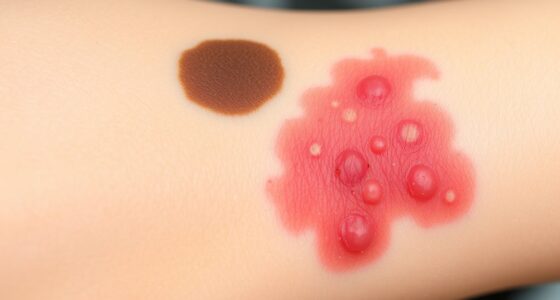As parents, we all know the dreaded feeling that comes with preparing for shots at 24 months. The anticipation, the uncertainty – it can be overwhelming.
But fear not, there are steps we can take to guarantee the process and make sure our little ones are well-prepared for their vaccinations. From understanding the vaccines schedule to comforting your child before shots, we're here to guide you through it all.
Stay tuned for valuable insights on how to make this experience as smooth as possible for both you and your toddler.
Key Takeaways
- Vaccines at 24 months are crucial for health and immunity.
- Comfort your child with distractions and reassurance during shots.
- Prepare for mild side effects post-vaccination like fever and soreness.
- Monitor your toddler for reactions and provide post-shot care as needed.
Understanding the Vaccines Schedule
As parents, we must grasp the importance of the vaccine schedule for our child's health and well-being at 24 months. At this age, the vaccines like MMR, varicella, and Hepatitis A play an important role in protecting our little ones from serious infectious diseases such as measles, mumps, rubella, chickenpox, and hepatitis A.
These shots aren't only essential for our child's individual immunity but also contribute to the larger community's health by maintaining herd immunity. The vaccines administered at 24 months are often booster doses, reinforcing the protection established by earlier vaccinations.
Comforting Your Child Before Shots

From grasping the vaccine schedule at 24 months, we can now focus on ways to comfort your child before they receive their shots. It's natural for parents to feel concerned about their child's anxiety during vaccination appointments, but there are steps you can take to help ease their worries.
Here are some tips to prepare and comfort your child before shots:
- Offer a familiar toy or blanket: Providing a comfort item can help distract and soothe your child during the shot.
- Use distraction techniques: Engage your child with activities like blowing bubbles or playing a game to ease their anxiety.
- Hold them securely: Embrace your child or hold them in your lap to provide a sense of security and reassurance.
- Offer praise and reassurance: Let your child know they're brave and loved before, during, and after the shot to reduce fear.
- Stay calm and composed: Your own demeanor can greatly influence your child's feelings, so remain calm to help them feel safe and supported throughout the vaccination process.
Tips for a Smooth Vaccination Appointment

To guarantee a smooth vaccination appointment, it's essential to arrive early for necessary paperwork and allow time for questions with the healthcare provider.
Making sure your child feels comfortable is key. Use plenty of soothing words, distractions like favorite toys or books, and gentle physical touch to help ease any anxiety. Keeping a positive attitude can also make a big difference in how your toddler experiences the visit.
It's normal for kids to have mild side effects like a low-grade fever, soreness at the injection site, or fussiness after getting shots. Be prepared with age-appropriate pain relief options and know that these effects usually pass quickly. Remember to follow any post-vaccine care instructions given by the doctor, including watching for any concerning symptoms.
Post-Shot Care for Your Toddler

After making sure your child's comfort during the vaccination appointment, it's important to be prepared to provide post-shot care for your toddler. Here are some essential steps to take care of your little one after receiving shots at 24 months:
- Provide Comfort: Cuddle your child, use cool compresses on the injection site, and encourage extra fluids to help ease any discomfort.
- Monitor Symptoms: Keep an eye out for mild side effects like soreness, redness, or a low-grade fever. Watch for any serious reactions such as a high fever, seizure, or severe allergic response.
- Record Vaccines: Maintain a record of the vaccines your child has received. This helps you stay on track with the immunization schedule.
- Contact Doctor: If you notice any concerning symptoms or your child experiences anything out of the ordinary, don't hesitate to contact your healthcare provider immediately.
Taking these steps can help ensure your toddler's well-being post-vaccination.
Managing Common Reactions to Vaccinations

Managing Common Reactions to Vaccinations can be a concerning aspect for parents, but understanding what's normal can help alleviate worries.
At 24 months, it's common for children to experience mild reactions such as a low-grade fever, fussiness, or soreness at the injection site post-vaccination. These reactions are usually mild and resolve on their own within a few days.
To help your child feel more comfortable, consider offering extra cuddles, encouraging fluids, and if needed, administering acetaminophen as per your healthcare provider's guidance.
While severe reactions to vaccinations are rare, it's essential to contact your healthcare provider immediately if you notice any concerning symptoms.
Keeping a record of the vaccines your child has received, along with any reactions, can aid in tracking their immunization history and discussing any concerns with healthcare professionals effectively.
Frequently Asked Questions
Do They Draw Blood at 2 Year Check Up?
At 2-year check-ups, blood draws may be necessary based on medical history, risks, or symptoms. If needed, a quick and gentle procedure is done by a trained professional to assess health. Discuss any concerns with the healthcare provider.
What Are the Screenings for a 24 Month Old?
At 24 months, screenings for a child may cover autism, developmental milestones, physical exams, growth parameters, language skills, social interactions, motor skills, vision, hearing, and behavior. These evaluations help guarantee holistic development and address any concerns promptly.
What to Expect After Baby Gets Shots?
After baby gets shots, expect mild side effects like redness, swelling, or fussiness. It's the body's way of building protection. Comfort with cuddles and fluids. Contact the healthcare provider for severe reactions like high fever.
How Do I Prepare My 2 Month Old for Shots?
Feeling nervous about getting shots? We comfort our little one with hugs and toys. Staying calm and reassuring during shots helps them feel safe. Expect some tears, but extra cuddles and distractions afterwards work wonders.
Conclusion
To summarize, preparing for shots at 24 months can be challenging, but it's important for our child's health. Remember, it's like crossing a bridge – a little scary at first, but we'll get through it together.
By understanding the vaccines schedule, comforting our child, and following post-shot care, we can help them stay healthy and strong.
Let's stay positive, stay informed, and keep our little ones protected.








